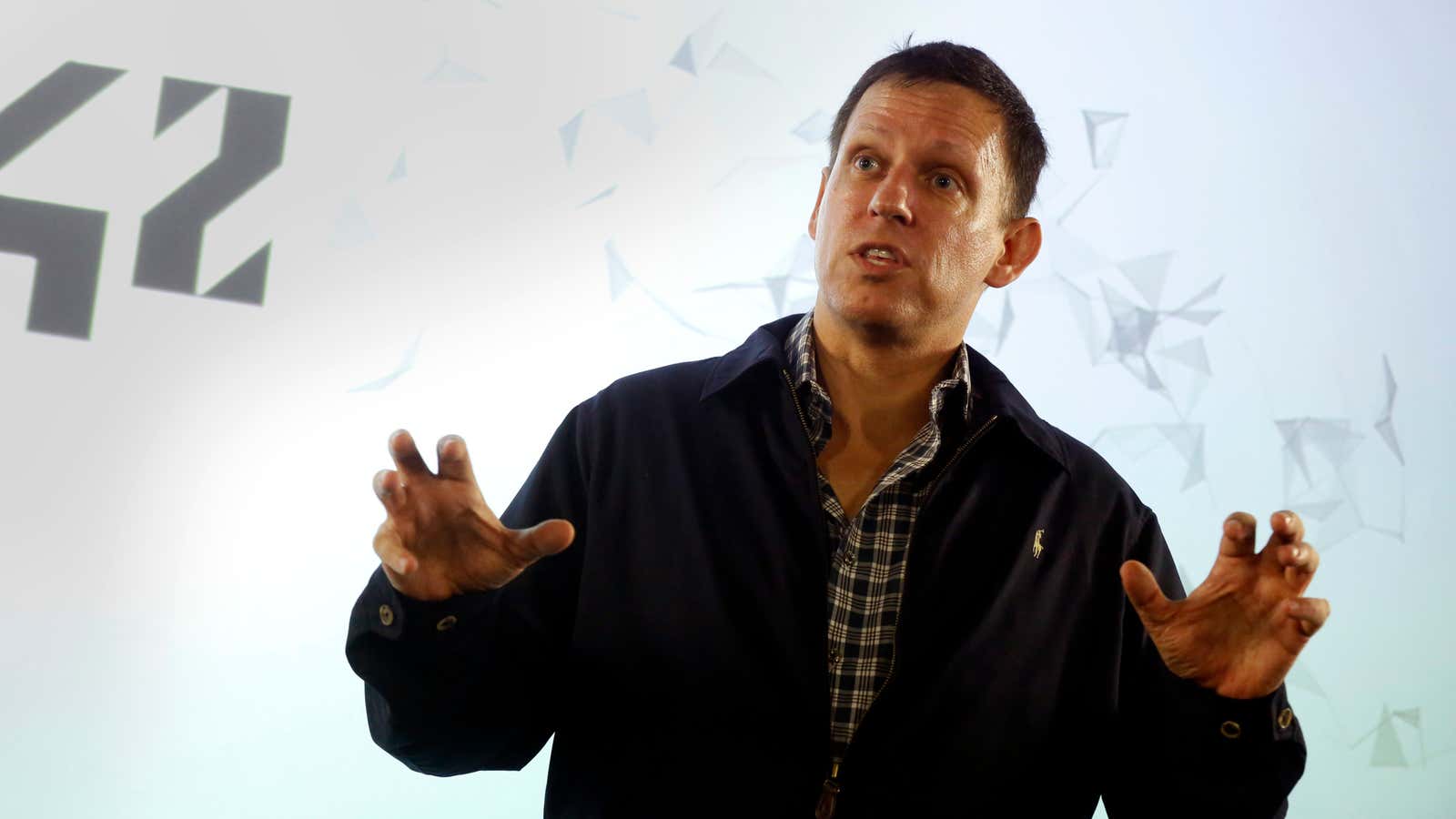Peter Thiel is a man who knows a thing or two about bubbles—he made a fortune in one and lost a fortune in another.
But in explaining his controversial support for Republican presidential candidate Donald Trump today—a support based on “bubble theory”—Thiel revealed some flaws in his investment analysis.
The tech billionaire made his mark on the political cycle when he became the first openly gay man to speak at the Republican National Convention in Cleveland, turning his remarks into a platform for political views that include a history of alt-right cultural politics and a rather apocalyptic narrative of the United States.
In today’s speech at the National Press Club, Thiel dismissed the identity politics that have driven the conversation about this election, setting aside Trump’s recollections of sexual assault in leaked video as “poor taste” and “clearly offensive.”
Instead, he characterized Trump supporters, including himself, as expressing a view that “we judge the leadership of our country to have failed.”
He blamed the tech bubble, during which he made his fortune as a founder and CEO of PayPal, on former president Bill Clinton, and the housing bubble on former president George W. Bush. In that episode, Thiel successfully bet against the housing market, but lost a fortune when he refused to change his positions during the recovery.
Thiel suggested that voters who didn’t support “outsider” Trump were buying into the same “over-optimistic stories” behind these bubbles. He blamed support for Democratic candidate Hillary Clinton on “the experience of the baby boomers, whose lives have been so much easier than their parents and their children,” which leads to “the habit of denying difficult realities, that’s how bubbles form.”
In fact, survey after survey shows that baby boomers prefer Trump to Clinton in the 2016 election.
Thiel also laid out a narrative of economic issues, including concerns about trade deals and stagnant incomes. There’s no question that these problems are real, and the US faces long-term fiscal-health challenges. But Thiel is backing the candidate who promises to drive the country deeper into debt, according to independent analysts.
Indeed, the problem with ascribing support for Trump to economic woes is that most people who support Trump say they do so for reasons unrelated to economics.
One study of over 100,000 Americans [pdf] found that most Trump supporters weren’t affected by trade or immigration, but rather found that “racial isolation and less strictly economic measures of social status, namely health and intergenerational mobility, are robustly predictive of more favorable views toward Trump.”
Thiel and Trump’s shared depiction of a country gone wrong—”no matter how crazy this election seems, it is less crazy than the condition of our country,” Thiel said—doesn’t quite jibe with rising approval levels for president Barack Obama (55% on Oct. 29) or optimistic levels of consumer confidence.
That disparity is certainly a window on the worldview of some of Trump supporters, if not what many would say is a realistic picture. Thiel drew jibes on Twitter when, asked about his funding of Hulk Hogan’s lawsuit against Gawker Media, he said that “single-digit millionaires” have “no effective access” to the courts.
But Thiel did put his finger on one unusual aspect of Trump’s appeal in the Republican party that might surprise those who consider him an arch-libertarian by citing the idea that “government has a job to do” and that “voters are tired of hearing conservative politicians say that government never works.”
Indeed, he backed big government projects like the creation of nuclear weapons, NASA’s moon exploration and the interstate highway, noting “that libertarianism would not have sold as well in the 40s or 50s or 60s in the US, a society where the premise that government couldn’t do anything didn’t make sense.”
In closing, he suggested his support for Trump was about creating a country that was more normal, like other developed countries. It’s not clear if that was intended to be a reference to the higher levels of taxation and spending in most other developed economies.
It’s always hard to say, since Thiel’s intellectual mien includes a background in the philosophy of Leo Strauss, where meaning can be extracted from a text only by the adept. He referenced these ideas, noting that Trump supporters, unlike the media, take their candidate “seriously, but not literally.”
Which suggests we might be wise to do the same for Thiel and his self-described “schizophrenic view of politics.”
